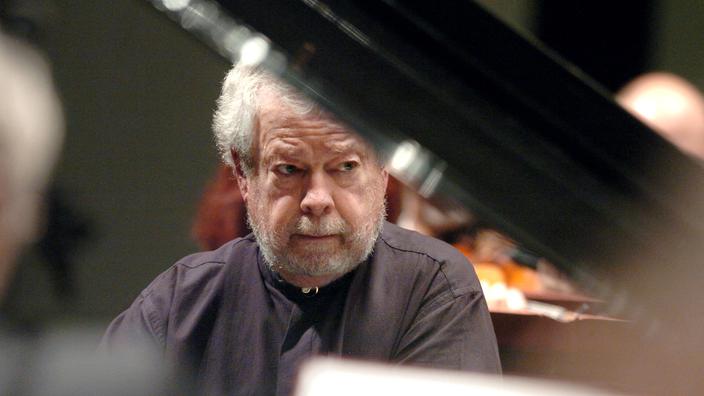Brazilian pianist Nelson Freire fell heavily in October 2019 and was then operated on for multiple fractures to his arm and shoulder, having tried to protect his hands in his fall.
He will not have survived this physical and psychological shock for very long, and it is at the age of 77 that he has just passed away in Rio de Janeiro.
With him disappears much more than a pianist: a musician at heart, deeply human, who had known how to weave despite (or thanks to) his great modesty and humility an authentic bond with the public, founded on sensitivity more than on virtuosity.
And yet, she was immense, her virtuosity even extraordinary.
Read alsoNelson Freire: "Nothing like discretion to talk about yourself!"
"
Born in 1944 in the village of Boa Esperança, in the state of Minas Gerais, in the hills where coffee is grown, he is the son of a pharmacist. It is for his sister that parents buy a piano, and yet it is the little one who is irresistibly attracted to the instrument, which he knows how to play immediately, almost naturally: his first teachers will say he is already trained. Music is the only thing that comes naturally for this fierce and fragile four-year-old, whose life is poisoned by a skin allergy that requires constant care, and by an inability to accept adult discipline. His parents give up their orderly life to move to Rio when he is six, so that he has the best teachers. But how to tame it? Her teacher, Lucia Branco, a student ofa disciple of Liszt, entrusts it to his assistant, Nise Obino, a strong woman ahead of her time, who will know how to find the words and the behavior to channel him and teach him to put his technique at the service of his musicality. A grant from the Brazilian government allows the teenager of fifteen to go to Vienna to study with the great pedagogue Bruno Seidlhofer: there he meets a classmate, his senior by three years, who was to be an intimate and unwavering friend. of a lifetime: Martha Argerich, who came from her native Argentina, and who must be inconsolable today. Their duets are irresistible because he is one of the few who can stand up to him.and who will know how to find the words and the behavior to channel him and teach him to put his technique at the service of his musicality. A grant from the Brazilian government allows the teenager of fifteen to go to Vienna to study with the great pedagogue Bruno Seidlhofer: there he meets a classmate, his senior by three years, who was to be an intimate and unwavering friend. of a lifetime: Martha Argerich, who came from her native Argentina, and who must be inconsolable today. Their duets are irresistible because he is one of the few who can stand up to him.and who will know how to find the words and the behavior to channel him and teach him to put his technique at the service of his musicality. A grant from the Brazilian government allows the teenager of fifteen to go to Vienna to study with the great pedagogue Bruno Seidlhofer: there he meets a classmate, his senior by three years, who was to be an intimate and unwavering friend. of a lifetime: Martha Argerich, who came from her native Argentina, and who must be inconsolable today. Their duets are irresistible because he is one of the few who can stand up to him.There he met a fellow student, his eldest three years, who was to be the intimate and unwavering friend of a lifetime: Martha Argerich, who came from her native Argentina, and who must be inconsolable today. . Their duets are irresistible because he is one of the few who can stand up to him.There he met a fellow student, his eldest three years, who was to be the intimate and unwavering friend of a lifetime: Martha Argerich, who came from her native Argentina, and who must be inconsolable today. . Their duets are irresistible because he is one of the few who can stand up to him.
Always warm and sensual sound
After several failures in international competitions, victory at the Vianna-da-Motta Prize in 1964 gave the signal for his career and his first recordings. His incredible interpretations of Liszt draw the image of a pianist with feline virtuosity, indomitable. Image fair but insufficient. Because beyond his dexterity, which he readily acknowledged that it had made things easier for him, beyond also his exceptional memory and his extraordinary ability to play unknown scores by already putting everything in place, this that interested him was the deep truth of music. The one he found while listening to the records of his lifelong idol, the Brazilian pianist Guiomar Novaes. This is reflected, in Nelson Freire's playing, above all in sound. His is never heavy or percussive,but always warm and sensual, of a great variety of colors, so that with him easily syrupy or superficial music like that of Tchaikovsky or Rachmaninov was never vulgar.
It is especially in the last phase of his recording career, with Decca, that the recording did justice to the beauty of its sound and its touch, particularly in Chopin, Brahms or Schumann.
It could happen that he seemed a little absent, when he didn't want to: the opposite of a robot.
This modest man liked less than anything to be on stage, his quest for musical truth was too interior to be satisfied with the glitter of the star-system.

